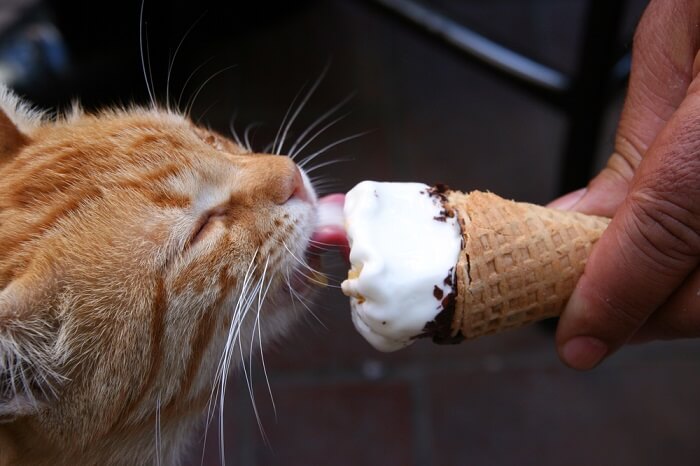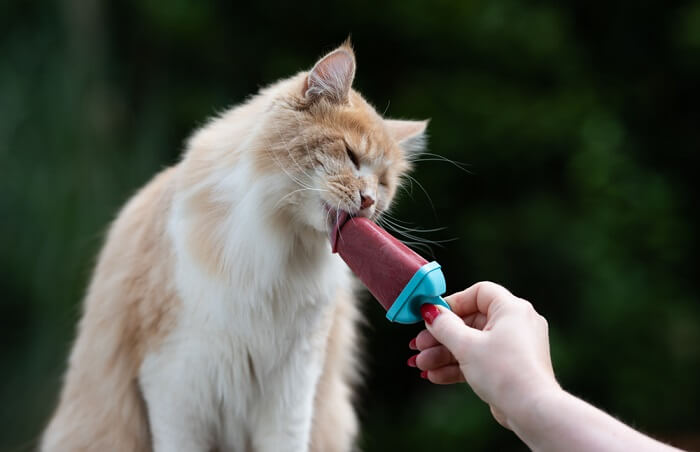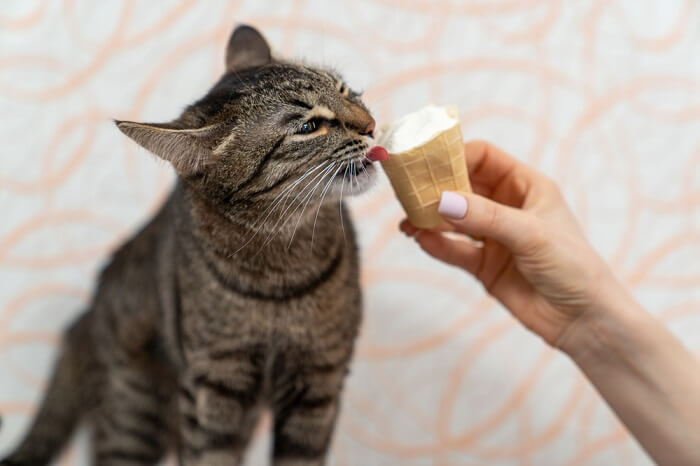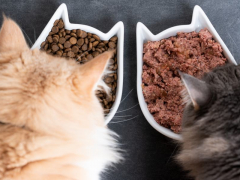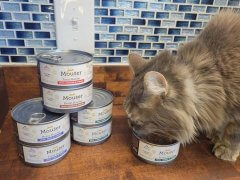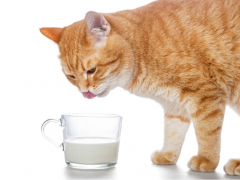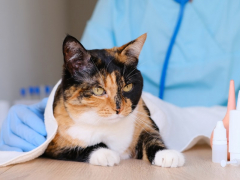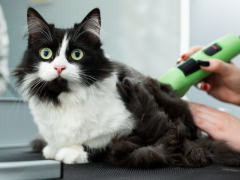On a warm summer day, there’s nothing better than creamy and refreshing ice cream to cool off. But what about our furry friends?
Can cats eat ice cream?
Just one lick can’t do any harm, right? Well, the answer is that cats shouldn’t eat ice cream. Certain flavors, like chocolate, could be toxic to your cat, but regardless of flavor, ice cream isn’t a good choice for your cat. Let’s find out why.
It might be tempting to feed your cat ice cream, especially on a hot day. However, plenty of healthier snack options are available that will provide the same nutrients.Quick Overview: Can Cats Eat Ice Cream?
Toxic: No
Commonly Allergenic: No
Species Appropriate: No
How Often to Feed: Occasional
How Much to Feed: Supplemental
Summary of Content
Is Ice Cream Bad for Cats?
We all know that too much fat and too much sugar are bad for us, but what are the exact risks of eating ice cream for your cat?
Well, firstly, the high-fat content could cause your cat a painful bout of pancreatitis, which could require intensive treatment from your veterinarian.
And let’s not forget obesity. If your cat piles on the pounds, they’ll be more at risk of heart disease and diabetes, as well as being more prone to painful arthritis when they’re older. The high sugar content is another risk factor for diabetes, so there is even more reason to avoid ice cream.
Feeding your cat anything new has the potential to upset their belly. However, something rich like ice cream, combined with the fact that cats are lactose intolerant, means that a bout of vomiting and diarrhea is far more likely.
In addition, ice cream might contain artificial sweeteners like xylitol, which is toxic to cats, and chocolate ice cream is a no-no for the same reason.
You might think you’re pretty safe reaching for dog ice cream; after all, that won’t be toxic to cats, will it? Well, no, but while it won’t be toxic, it’s still high in calories, sugars, and fat, so it’s not a healthy option for your feline friend.
Is Ice Cream Safe for Cats?
Although a small amount of ice cream is typically safe for cats, feeding your cat ice cream has no health benefits. In fact, feeding your cat ice cream could cause negative health issues. Even ice cream made for dogs is high in fat and calories, though it’s free from toxic ingredients.
How Much Ice Cream Can a Cat Eat?
Though your cat might want a lick of your ice cream, this sweet treat isn’t a healthy option.
It’s best to avoid ice cream altogether. This isn’t just because ice cream contains fat and sugar. Chocolate ice cream may be toxic, and peanut butter ice cream may contain the poisonous sweetener called xylitol.
If you’re sure that your ice cream is free from toxins and you’re determined to offer your kitty a taste, it should be a tiny amount.
Cats are lactose intolerant so ice cream may upset their stomach, and the high-fat content could cause pancreatitis. You shouldn’t offer more than a lick or two, and even that could cause a problem in a sensitive cat.
How Often Can a Cat Eat Ice Cream?
Cats don’t need ice cream. It might seem like a special, tasty treat, but it’s probably not worth the risk of causing your poor cat a bout of diarrhea.
However, if you’re sure you want to offer ice cream, only offer plain vanilla ice cream and make sure it’s free from dangerous artificial sweeteners like xylitol. Ideally, you wouldn’t offer it regularly, just once in a blue moon, or even less!
Do Cats Like the Taste of Ice Cream?
if you do decide to give your cat ice cream, make sure it’s plain vanilla and only let your cat have a few licks.
There’s no denying that cats enjoy the taste of ice cream. But shouldn’t they hate it because it’s bad for them?
This wouldn’t be the first example of cats enjoying the taste of things that aren’t good for them. Cats love the taste of milk, and it’s been a widespread view over the years that you should offer a stray or visiting cat a saucer of milk.
However, milk isn’t suitable for cats either since they can’t break down the sugar lactose. Just like milk, if you offer your cat ice cream, you could risk upsetting their stomach.
Summary
It might be tempting to feed your cat ice cream, especially on a hot day. However, plenty of healthier snack options are available that will provide the same nutrients.
If you’re looking to cool your cat down, it’s better to make sure they have plenty of cool water sources to drink from and a shady spot to rest.
Frequently Asked Questions
Can cats eat chocolate ice cream?
It's safest not to offer your cat any ice cream since it's not a healthy option for them and might cause vomiting and diarrhea. However, chocolate ice cream might contain theobromine, which is toxic to cats, making it even more dangerous than plain vanilla ice cream. Don't forget some mint ice creams have chocolate chips, and these should definitely be avoided.
Can cats eat vanilla ice cream?
It’s important to realize that all ice cream is unhealthy for cats, even if it’s plain vanilla. Aside from the risk of sweeteners, vanilla ice cream could cause your cat vomiting and diarrhea, or even pancreatitis. If given as a regular treat, it could even lead to ailments like obesity, diabetes, or heart disease.
Can cats eat dog ice cream?
Dog ice cream is free from chocolate and xylitol and contains no other toxic ingredients. However, this doesn’t make it perfectly safe for your cat. You might assume dog ice cream contains far less fat and sugar, but it's surprisingly similar. So, even though it's free from poisonous ingredients, it could still expand your pet's waistline.
Can cats eat strawberry ice cream?
Like any other flavor of ice cream, strawberry ice cream isn't a healthy choice for your cat. You might wonder whether the strawberries add additional nutritional value, perhaps more vitamins. However, no matter if there are other nutritional benefits, they are still outweighed by the risks of feeding your cat ice cream.
